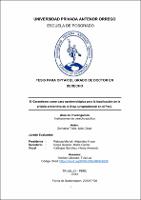| dc.contributor.advisor | Benites Vásquez, Tula Luz | |
| dc.contributor.author | Zumaeta Tafur, Julio César | |
| dc.creator | Zumaeta Tafur, Julio César | |
| dc.date.accessioned | 2023-09-21T20:11:20Z | |
| dc.date.available | 2023-09-21T20:11:20Z | |
| dc.date.issued | 2023 | |
| dc.identifier.uri | https://hdl.handle.net/20.500.12759/11202 | |
| dc.description.abstract | En la presente investigación titulada “El Garantismo como base epistemológica, para la
inaplicación de la prisión preventiva en la línea jurisprudencial en el Perú”, se interpretó
la legislación vigente, doctrina y jurisprudencia, pues tuvo el propósito de identificar, las
percepciones sobre el Garantismo procesal, como base epistemológica para la
inaplicación de la prisión preventiva, en la línea jurisprudencial en el Perú, que manejan
los abogados penalistas que laboran en el distrito judicial de Amazonas.
La investigación realizada fue de tipo aplicada, descriptivo exploratorio y dogmáticojurídico,
siendo el diseño de investigación no experimental, debido a que en esta
investigación solo se examinaron las variables e indicadores, sin manipular ninguna de
las variables porque dichos fenómenos de estudio ya ocurrieron, donde la unidad de
análisis fueron jurisprudencias relacionadas con el tema, así pues los métodos de
recolección de datos fueron a través del análisis profundo de las resoluciones que
conformaron la muestra.
Entre sus principales resultados se evidenció que el 67% de los operadores jurídicos
considera que la inaplicación de los lineamientos del Garantismo procesal, inciden
significativamente en el dictado de la prisión preventiva al vulnerarse los derechos de
rango constitucional y convencional. Finalmente, se llegó a la conclusión que las medidas
cautelares de coerción procesal que se vienen dictando dejan de lado los derechos
fundamentales de los imputados, al restringirse derechos como el derecho de defensa y
debido proceso. | es_PE |
| dc.description.abstract | In the present investigation entitled ““The guarantee as an epistemological basis, for the
non-application of preventive detention in the jurisprudential line in Peru““, the current
legislation, doctrine and jurisprudence were interpreted, since it had the purpose of
identifying the perceptions about the guarantee procedural, as an epitemological basis for
the non-application of preventive detention, in the jurisprudential line in Peru, handled
by criminal lawyers who work in the judicial district of Amazonas, 2021. The
investigation carried out was applied, descriptive, exploratory and dogmatic. legal, being
the non-experimental research design, because in this research only the variables and
indicators were examined, without any of the variables being manipulated because said
study phenomena already occurred, where the unit of analysis was the judicial decisions
issued by the Preliminary Investigation Courts of the Amazonas Judicial District, Thus,
the data collection methods were through the deep analysis of the judicial decisions that
have formed the sample. Among its main results, it was evidenced that 67% of the legal
operators consider that the non-application of the guidelines of the Procedural Guarantee,
significantly affect the issuance of preventive detention by violating the rights of
constitutional and conventional rank. Finally, it was concluded that the precautionary
measures of procedural coercion that have been issued leave aside the fundamental rights
of the accused, by restricting rights such as the right to defense, due process and due
motivation. | en_US |
| dc.description.uri | Tesis | es_PE |
| dc.format | application/pdf | es_PE |
| dc.language.iso | spa | es_PE |
| dc.publisher | Universidad Privada Antenor Orrego | es_PE |
| dc.relation.ispartofseries | D_DERE_062 | |
| dc.rights | info:eu-repo/semantics/closedAccess | es_PE |
| dc.rights.uri | https://creativecommons.org/licenses/by/4.0/ | es_PE |
| dc.source | Universidad Privada Antenor Orrego | es_PE |
| dc.source | Repositorio institucional - UPAO | es_PE |
| dc.subject | Garantismo procesal | es_PE |
| dc.subject | Prisión preventiva | es_PE |
| dc.title | El Garantismo como base epistemológica para la inaplicación de la prisión preventiva en la línea jurisprudencial en el Perú. | es_PE |
| dc.type | info:eu-repo/semantics/doctoralThesis | es_PE |
| thesis.degree.grantor | Universidad Privada Antenor Orrego. Escuela de Postgrado | es_PE |
| thesis.degree.name | Doctor en Derecho | es_PE |
| thesis.degree.discipline | Doctorado | es_PE |
| dc.subject.ocde | http://purl.org/pe-repo/ocde/ford#5.05.00 | es_PE |
| renati.advisor.orcid | https://orcid.org/0000-0002-8666-9236 | es_PE |
| renati.author.dni | 43265411 | |
| renati.advisor.dni | 17927809 | |
| renati.type | http://purl.org/pe-repo/renati/type#tesis | es_PE |
| renati.level | http://purl.org/pe-repo/renati/level#doctor | es_PE |
| renati.discipline | 421998 | es_PE |
| renati.juror | Rebaza Martell, Alejandro Arturo | |
| renati.juror | Rojas Guanilo, María Cecilia | |
| renati.juror | Carbajas Sánchez, Henry Armando | |
| dc.publisher.country | PE | es_PE |




